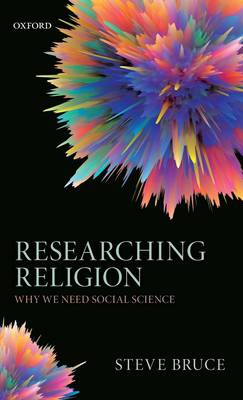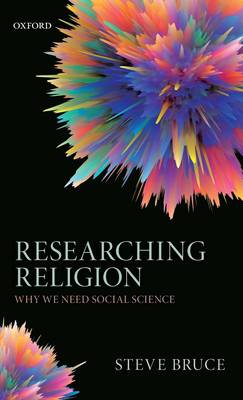
- Afhalen na 1 uur in een winkel met voorraad
- Gratis thuislevering in België vanaf € 30
- Ruim aanbod met 7 miljoen producten
- Afhalen na 1 uur in een winkel met voorraad
- Gratis thuislevering in België vanaf € 30
- Ruim aanbod met 7 miljoen producten
Zoeken
Omschrijving
Researching Religion: Why We Need Social Science establishes the relevance of social science for the study of religion and promotes a particular kind of social science. Even if we confine ourselves to academic disciplines, there are very many ways of viewing religion. Certain kinds of
questions about religion can only be answered by the methods and approaches of social science: if one is interested in the social causes and consequences of religious belief and behaviour, then one has to do social science. Steve Bruce underlines the value of quantitative social research. He shows
that while detailed ethnographies have enormous value in helping us get 'inside' religious belief and behaviour, they are severely limited by problems of scale and representativeness in their value for generating and testing explanations. While the primary focus is social research, the examples are
drawn from studies of religious belief and behaviour, so it also presents a very large number of important observations about the nature of religion in the modern world. This book is an informative, concise reference for students trying to unpick quantitative religious research. It shows how to
gather valuable research and avoid pitfalls.
questions about religion can only be answered by the methods and approaches of social science: if one is interested in the social causes and consequences of religious belief and behaviour, then one has to do social science. Steve Bruce underlines the value of quantitative social research. He shows
that while detailed ethnographies have enormous value in helping us get 'inside' religious belief and behaviour, they are severely limited by problems of scale and representativeness in their value for generating and testing explanations. While the primary focus is social research, the examples are
drawn from studies of religious belief and behaviour, so it also presents a very large number of important observations about the nature of religion in the modern world. This book is an informative, concise reference for students trying to unpick quantitative religious research. It shows how to
gather valuable research and avoid pitfalls.
Specificaties
Betrokkenen
- Auteur(s):
- Uitgeverij:
Inhoud
- Aantal bladzijden:
- 256
- Taal:
- Engels
Eigenschappen
- Productcode (EAN):
- 9780198786580
- Verschijningsdatum:
- 30/10/2018
- Uitvoering:
- Hardcover
- Formaat:
- Genaaid
- Afmetingen:
- 137 mm x 218 mm
- Gewicht:
- 439 g

Alleen bij Standaard Boekhandel
+ 148 punten op je klantenkaart van Standaard Boekhandel
Beoordelingen
We publiceren alleen reviews die voldoen aan de voorwaarden voor reviews. Bekijk onze voorwaarden voor reviews.








